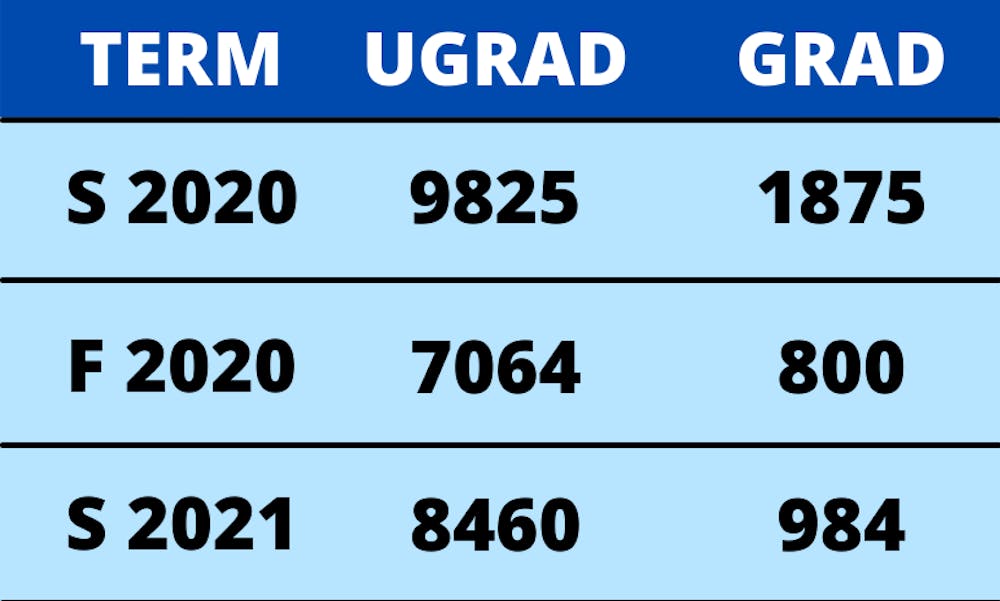In spring 2020, as the COVID-19 pandemic unfolded, the University created the option for students to choose between a credit/general credit/no credit or a standard letter grading scale for each class. This decision was made with hopes that it would help students and teachers alike adjust to online learning and any other unforeseen circumstances that might arise as the pandemic progressed. Now, over a year later, students have been taking advantage of the grading option for three semesters with more students taking advantage of it this past spring than in previous semesters.
However, according to University spokesperson Wes Hester, this grading option will no longer be guaranteed moving into the fall semester.
“We do not anticipate maintaining the COVID CR/GC/NC option going forward,” Hester said. “The COVID CR/GC/NC grading option was developed in order to help students grappling with unexpected circumstances due to the pandemic, and we anticipate that the majority of those circumstances will be mitigated with the return to in-person instruction and on-Grounds housing this fall.”
Despite this change for the fall semester, students taking summer session classes are still able to use the credit/general credit/no credit system.
Instead of having to choose credit/general credit/no credit for all of their classes or none, students could select which classes they wanted to use the grading option in. In spring 2020, the first semester during which the credit/general credit/no credit grading option was available, 9,825 undergraduate students and 1,875 graduate students — 58.5 percent and 23.8 percent of each population, respectively — elected to utilize the grading system for one or more of their classes.
Over the course of the next two semesters, considerably fewer graduate students opted to use the COVID-19 grading system. In fall 2020, only 800 graduate students elected to use this grading system while in spring 2021, 984 graduate students chose to use the COVID-19 grading system.
By comparison, the number of undergraduate students who used the COVID-19 grading system fluctuated over the course of three semesters. In fall 2020, 7,064 students elected to use credit/general credit/no credit. This past spring, the number increased to 8,460 undergraduate students.
Rising third-year College student Carly Dvorin commented on her experience with this grading option amidst the COVID-19 pandemic. During the past two semesters, she used the credit/general credit/no credit option due to difficulties adapting to online learning. The pandemic also brought stress and anxiety to her personal life, resulting in her grades not being as high as they could be. This semester, however, she chose to take her classes for a grade.
“It has been nice to have this option as a cushion to help ease the blow of COVID and has also been a good way to boost many students’ GPAs,” Dvorin said. “However, [last spring] I decided not to utilize this option as I am worrisome that the credit/no credit grading option will not look great on resumes for future job searches or further education. I also knew taking my classes for a grade would motivate me to work harder again and start adapting back to my previous work ethic before the pandemic.”
Premed students applying to medical school after graduation have also had to weigh multiple factors in their decision about whether or not to opt into the COVID-19 grading system, including how medical school admissions committees may view this option on transcripts.
Dr. John Densmore, associate dean for admissions and student affairs at the School of Medicine, said in November that although the University does not require any prerequisites for its medical school and therefore accepts the credit/general credit/no credit option, seeing letter grades could be more informative for admissions committees.
Rising second-year College student Keerthana Pasumarthy felt that taking the option may be a disadvantage to them when applying to medical programs, and Class of 2021 alumna and premed student Katie Stombres agreed.
“Now all of my classes are on Zoom and I have very little opportunity to get much needed hands-on experience, not to mention the fact that I now have to bond with my professors during their online office hours so they can write me a recommendation,” Stombres said to The Cavalier Daily in November. “I do not have time to worry whether or not taking classes C/NC will mess up my application. I can’t afford to not get grades.”
Some medical schools, however, such as the David Geffen School of Medicine at UCLA and Harvard Medical School, announced last spring that courses taken on a pass/fail basis would be accepted during the admissions cycle.
In a letter to students in April 2020, Provost Liz Magill discussed the underlying impetus behind the decision to provide students with an alternative grading system.
“We were guided by several core principles: reducing the stress and anxiety among our students by making this decision prior to the start of the online courses; providing clarity and choice … during a time of unprecedented uncertainty and disruption; and understanding the impact of transitioning to a remote learning environment,” Magill said.
Classes that are taken as credit/general credit/no credit do not impact the student’s GPA in any way. Under the COVID-19 grading option, undergraduate students that receive credit in a class will be allowed to count that class toward degree requirements needing a C or higher. General credit counts toward degree requirements if a passing grade below a C is rewarded. No credit does not count toward any degree requirements and is awarded if the student receives an F.
Engineering, Batten and Commerce graduate classes share rules and standards for their COVID CR/GC/NC grading scale. Credit will be awarded if the student earns a C or higher, while general credit will be awarded if the student receives a passing grade below a C. Students who receive general credit will earn the credit hours associated with the course and satisfy degree requirements for Commerce, but not graduate Engineering or Batten requirements. No credit will be awarded if the student receives a grade of F.
Other graduate classes award credit if the student receives a B- or higher, and there is no general credit option.
April 30 at 11:59 p.m. was the final deadline for students to select the credit/general credit/no credit grading option for the spring semester. The College of William and Mary’s deadline was on the same day, a change from their previous policy in the fall in which students who wanted to opt in to the pass/fail grading option had to make their decision before the add/drop period. The University of North Carolina set a similar date for its pass/fail deadline, with students having to opt-in to the option by their final day of classes. On the other hand, some schools — such as Yale University, Dartmouth University and Harvard University — returned to a normal grading system during fall 2020 and spring 2021.
After nearly three semesters online, students are excited to return to an in-person learning experience in the fall. Rising third-year College student Meg Woodard is looking forward to learning face-to-face.
“I definitely think it’s a nice option to have, with all classes being online, especially because I am a person who learns better in a face to face setting rather than over a computer screen,” Woodard said.
A return to in-person learning will pose unique challenges to students and professors who have grown accustomed to the online learning experience and its particular affordances. However, most students are looking forward to a return to normalcy.







